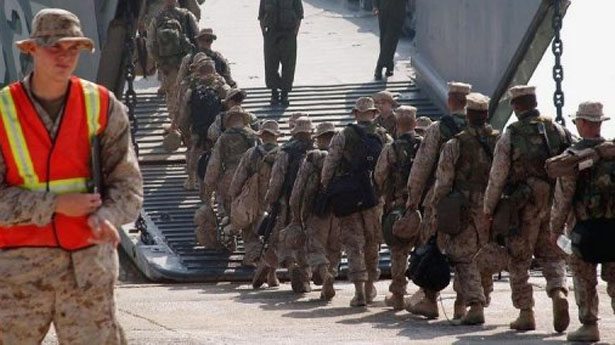Australia and the United States will sign a 25-year deal allowing 2,500 US Marines and air force personnel to train Down Under, Defence Minister David Johnston said Monday, describing it as a “win-win situation”.
The agreement will be inked Tuesday when US Secretary of State John Kerry and Defense Secretary Chuck Hagel meet with their Australian counterparts Julie Bishop and Johnston in Sydney.
Trouble spots abroad including Iraq and Ukraine will also be on the agenda for the Australia-US Ministerial Consultations (AUSMIN), which focus on regional security and military cooperation.
But the centerpiece will be the agreement allowing the Marine rotational deployment in the northern city of Darwin, which was first announced by US President Barack Obama in 2011 as part of his “pivot” towards Asia.
“Approximately 2,500 US defence force personnel will come to primarily the Northern Territory to exercise on the vast, open Commonwealth (government) military exercise grounds that we have,” Johnston told a joint press conference with Hagel.
“They will inter-operate with Australia. They will do things that they want to, exercise activities that are important to them. We’ll assist them.”
Johnston said as many as 1,200 US Marines and air force personnel were already rotating into Darwin during the current dry season in Australia’s tropical north.
“These are the things that are benefiting Australia and the flip side of that coin is that we have just a lot of space that’s open for practice, exercises… so it’s a win-win situation for both of us,” he said.
Hagel said the deal emphasized Washington’s “re-balance” towards the Asia-Pacific, saying the United States was a Pacific power holding about 200 ships and more than 360,000 personnel in the region.
“We are not going anywhere,” Hagel said. “Our partnerships are here, our treaty obligations are here and are important to us.
“It’s pretty clear that the US is committed to this part of the world but also this does not mean a retreat from any other part of the world. We have interests all over the world,” he added.
More ways to cooperate
Hagel said the talks on Tuesday, which analysts had said would likely pave the way for enhanced military cooperation between the allies, would give officials an opportunity to explore “better ways we can cooperate”.
“We will address a number of issues tomorrow. They will focus on maritime security, special forces, missile defence and Afghanistan,” he said.
He said the situation in Ukraine would also be on the agenda, as well as the threat from jihadist fighters of the Islamic State in Iraq, where Australia has offered to assist the US in humanitarian airdrops to those trapped by the violence.
Bates Gill, chief executive of the US Studies Centre at the University of Sydney, said the talks would be an important next step in what appeared to be “a growing degree of access and presence for American assets both human and materiel on Australian territory”.
Gill said progress had been slow but careful since the announcement that Marines would rotate through Darwin, an agreement which rankled China.
It also caused concern for some Asian neighbors who saw it as a statement by Washington that it intends to stand up for its interests in the region amid concern about Beijing’s growing assertiveness.
The United States currently has only a limited deployment in longstanding ally Australia, including the Pine Gap Joint Defence Facility spy station near Alice Springs.
Regional security issues in Southeast Asia and the Pacific will be discussed in the AUSMIN talks, along with Myanmar, where Kerry and Bishop have just attended the Association of Southeast Asian Nations forum.
The ministers will also talk about Northeast Asia, comparing notes about their respective relations with China, and the challenges posed by North Korea










